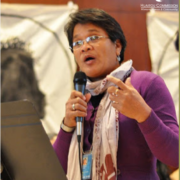Grassroots leaders share experience and insights at the CBA15 global conference in June 2021

In a series of grassroots-led sessions, co-hosted virtually by the Huairou Commission together with the Slum Dwellers International (SDI), Practical Action, International Research Institute for Climate and Society (IRI), CJRF and the IIED at the 15th International Conference on Community-based Adaptation to Climate Change (CBA15), our grassroots women leaders shared key strategies and insights for building climate resilience and for addressing the Covid-19 crisis. They highlighted the importance of implementing the locally-led adaptation principles, that are now endorsed by over 40 organisations. The virtual event took place between 14-18 June, 2021.
In the ‘Innovations for adaptation by Urban communities: The transformative power of citizen led data’ session, Veronica Katulushi from Zambia’s Poor and Homeless People’s Federation shared insights on grassroots women’s access and control over land in urban informal settlements using the STDM approach (a pro-poor land information and mapping tool) by which women map their land boundaries, reaffirm the information by their communities and present it to the government who accept the information and grant formal land titles to grassroots women. Access to land, gives women the options to look at resilience building practices such as growing vegetables for consumption and selling the produce that secures their food and income during climate and other emergencies.
The speakers at the session on ‘Principles for Locally Led Action: How can we see driving real impact’ discussed the eight LLA principles that guide the adaptation community as it develops actions that are increasingly recognised as being led by local communities. Ibu Warsila, a grassroots leader from Yakkum Emergency Unit, Indonesia supported by Agnes Meira, spoke about the strategic investments made through Community Resilience Fund (CRF) to advance locally-led adaptation actions and empower grassroots by putting flexible finance in their hands.
In the ‘What Women Want: How Grassroots and Urban Poor Women are Impacting Change in Climate Adaptation Policy and Practice’ session, speakers focused on issues faced by women and their communities and the strategies and solutions adopted by them which are related to critical adaptation practices that are essential to build resilience and reduce disaster risks. The session also called for collaboration and partnerships with grassroots groups in designing solutions. Leah Candela and Jhocas Castillo, grassroots leaders from DAMPA, Philippines, shared their food and livelihoods security strategies and government partnerships to build community resilience during climate risks and Covid-19 pandemic and called for the inclusion of grassroots women’s groups in the decision-making spaces. Naseem Shaikh (SSP, India), highlighted the innovative practices led by grassroots women to improve community health and nutrition through organic farming and vegetable gardening, especially when faced with drought; and the need to collaborate with and invest in grassroots women’s groups.
In the session on ‘Climate 101: Climate Science for Community-based Organisations’, Doreen Magotsi, a grassroots leader from Shibuye Community Health Workers, Kenya, shared her experience of working to create climate information centres, in partnership with the agriculture and meteorological department, for grassroots women to visit and get up-to-date climate and weather-related information from both the government and local traditional sources. The key takeaway from this session was the need to build local capacity to facilitate greater dialogue between climate scientists and communities, enabling them to identify key elements from local knowledge and practices that can help climate information providers to better tailor climate services.

Veronica Katulushi 
Leah Candela 
Doreen Magotsi 
Naseem Shaikh 
Jhocas Castillo
CBA15 was an opportunity for Huairou Commission and its partners to highlight grassroots women’s leadership in advancing climate adaptation by focusing on how locally led actions are driving climate actions. Additionally, it acted as a platform to share learnings and build global commitments to grassroots-led strategies.
Session Links:
Innovation for adaptation by urban communities: transformative power of citizen data
Session recording link:https://zoom.us/rec/play/kHc-uug-IymfupuKzNO42F3nZc2llchf5QmZ-Mq04Kn2gbLgYeLSb_L_b37-23hpICMKS5W3yw208_2i.-nQlf0Pv3ivsWqKX?autoplay=true
Locally Led Action principles: how can we see them driving real impact?
Session recording link: https://www.youtube.com/watch?v=CBanHtXbQm0
What women want: how Grassroots and Urban Poor Women are Impacting Change in Climate Adaptation Policy and Practice
Session recording link: https://youtu.be/D4OjHL6HLio
Climate 101: Climate Science for Community-based Organisations
Session Recording Link: https://www.youtube.com/watch?v=bEfYgXTuzxY
